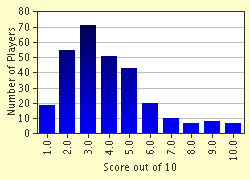Quiz Answer Key and Fun Facts
1. Who was the leader of the Cetniks, a would-be resistance group in Yugoslavia?
2. Which of these people publicly spoke out in wartime Britain against area ('carpet') bombing?
3. This man was the first Prime Minster of the Polish government-in-exile in London. His death has brought forth a vast number of conspiracy theories.
4. Who was Japanese Chief of the Naval General Staff between 1941 and 1944?
5. Early in the interwar period Field Marshal Earl Alexander of Tunis spent a while doing something highly unorthodox, if not bizarre, for a senior British officer. What was it?
6. Who was Chief of Staff (head honcho) of the (British) Royal Air Force from October, 1940 till the end of the war?
7. Who was United States Secretary of War during America's involvement in the war?
8. Who said "I am become Death, the shatterer of worlds"?
9. Who invented the term 'totalitarian'?
10. Who was Commander-in-Chief of the German Army from 1938-1941?
Source: Author
domoarigato
This quiz was reviewed by FunTrivia editor
bloomsby before going online.
Any errors found in FunTrivia content are routinely corrected through our feedback system.

